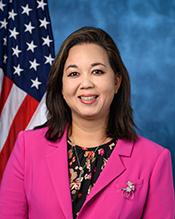US Representative
Jill Tokuda
Biography
Born in Honolulu County, Hawaii, on March 3, 1976, the politician graduated from James B. Castle High School in Kaneohe, Hawaii, before earning a Bachelor of Arts degree from George Washington University in Washington, D.C. in 1997. Their career includes roles as a consultant, nonprofit executive, and business owner, as well as serving as a staff member under Hawaii Lieutenant Governor Mazie Hirono. From 2007 to 2018, they were a member of the Hawaii State Senate, where they held the position of majority whip from 2009 to 2014. They were elected as a Democrat to the U.S. House of Representatives in the 118th Congress, beginning their current term on January 3, 2023.
In Congress, they have engaged actively in various legislative efforts, primarily focusing on issues related to transparency, cultural preservation, and social services. Notable bills they have co-sponsored include the Combating Global Corruption Act of 2023 (HB457), which seeks to address corruption in foreign governments and mandates the Department of State to publish a tiered ranking of countries based on their anti-corruption efforts. This bill aims to enhance transparency and good governance internationally, likely fostering pressure on poorly performing countries to improve their frameworks to avoid reputational consequences in diplomatic relations.
Another significant effort is the Expressing support for Hawaiian Language Month (HR136), which recognizes February 2025 as 'Olelo Hawai'i Month'. This resolution not only endorses cultural recognition and preservation of the Hawaiian language but could also bolster educational initiatives aimed at revitalizing this important cultural asset amidst declining usage due to past suppression.
They have also sponsored the Stop Illegal Campaign Coordination Act (HB2476), which looks to amend campaign finance regulations effectively. The bill aims to improve transparency in campaign financing by altering how certain spending is classified regarding political candidates and entities, potentially allowing for increased accountability within campaign operations.
The political inclinations of this member may be characterized as center-left to progressive, given their focus on promoting anti-corruption, enhancing cultural heritage, and supporting protective measures for vital social programs like Social Security and Medicare. Bills such as those aimed at enriching the Hawaiian language and addressing corruption showcase a commitment to both cultural preservation and active participation in international standards for governance.
On a personal level, details regarding their family life or specific business pursuits remain unspecified but could be essential for comprehensive insight, particularly for lobbying entities seeking to understand the dynamics influencing their legislative priorities. Their diverse professional background in nonprofit and business sectors could imply a nuanced understanding of both civic engagement and economic issues, thereby informing their decision-making process in Congress.
Overall, their current legislative agenda reflects a focus on transparency, cultural championing, and social equity, underlining their commitment to representing the interests of their constituents and the broader American community.
